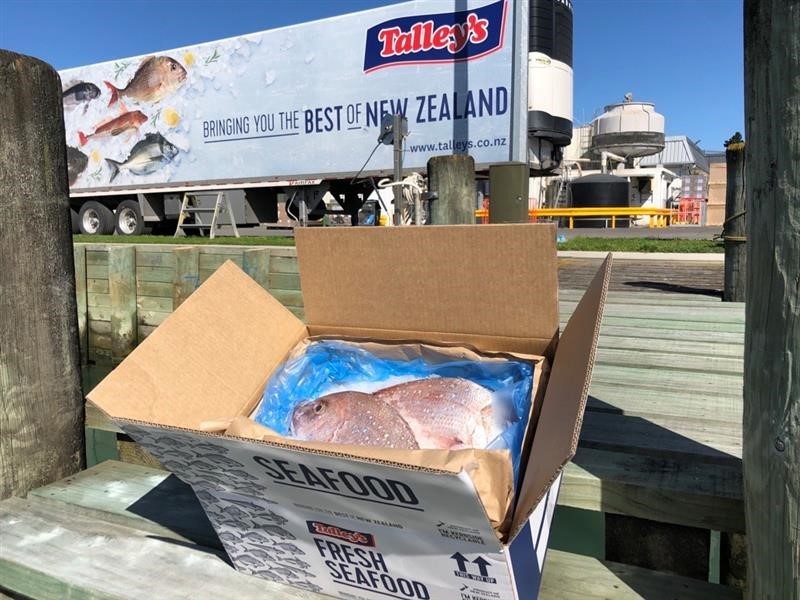Sustainability beyond our oceans
February 10, 2021

Talley’s turn the dial on cold chain sustainability with a zero-landfill packaging solution
Sourced from New Zealand’s pristine waters, Talley’s vertically integrated supply chain prides itself on harvesting and sourcing quality wild caught seafood to the world. Keeping harvests fresh across the cold chain needs to be fail proof and what’s more, it needs to be sustainable.
While expanded polystyrene (EPS) bins have been the industry go-to solu
tion for keeping seafood chilled during distribution, retailers across New Zealand have started the phasing out of EPS in search of alternate solutions that yield better end of life outcomes.
“Sustainability is something we take seriously at Talley’s. Our eco-conscious values mean we ensure sustainability is embedded in everything we do, from how we catch our fish right through to how we package and distribute it. While EPS bins ensured that seafood arrived fresh to supermarkets, they posed environmental and logistical challenges across the distribution network. We needed to find a new way,” says Greg Buckett, Talley’s key account manager.
A time to rethink EPS
It is estimated Kiwis throw away around 157,000t of food each year. A considerable portion of this food waste comes from both household waste as well as retail waste. According to The University of Otago, 19% of all retail food waste and food diversion is attributed to meat and seafood. Minimising retail food waste requires food to be received in its freshest state without any compromise to shelf life.
While EPS is an effective and reliable insulator, users of this material are significantly challenged when it comes to end of life recovery. Currently, kerbside recycling infrastructure is not equipped to recycle EPS, so it is diverted to landfill where it often flakes into smaller easily transportable pieces, contaminating waterways and waste streams.
“Solutions that enable better end of life recovery outcomes are a business imperative. Our commitment to sustainability spans beyond our oceans. EPS boxes are bulky to transport and store. In a typical year, we would have utilised over 180,000 EPS containers which would occupy a footprint of approximately 6760 cubic metres in landfill sites,” says Buckett.
For Sealed Air, factors affecting packaging’s ‘end of life recovery’ are significant factors when designing packaging. All design principles must align with the goals of Sealed Air's 2025 Sustainability and Plastics Pledge, which promotes the advancement of packaging solutions to be 100% recyclable by 2025.
Tony Wyllie, Talley’s account manager for Sealed Air says: “Sealed Air is in business to solve critical packaging challenges and we were delighted to present Talley’s with a solution that aligned with its eco-conscious values, and meet industry and retailer requirements for recyclable packaging.”
Sealed Air brand TempGuard is a fully (100%) kerbside recyclable secondary packaging solution developed for the shipping of perishable and temperature sensitive goods for up to 48 hours.
TempGuard is made from 100% paper and comprises a minimum of 80% recycled content. It is the only all paper temperature assurance product in the New Zealand market that offers consumers a 100% kerbside recyclable option. Its padded format absorbs pack condensation while also providing cushioning and protection of the product.
TempGuard is also space efficient. Unlike bulky substitutes like EPS which has a wall thickness of 30mm, TempGuard padded liners are only 14mm thick, allowing processors to reduce carton size and drive efficiency in warehousing and transportation.
Talley’s get hooked on Sealed Air brand TempGuard
Talley’s began trialing TempGuard during New Zealand’s summer months. “We chose the hottest days of the month to ship fresh seafood across the nation. We were expecting compromised performance because we’ve trialed cardboard concepts before, and while they’ve worked okay on cooler days, they performed poorly on our hot summer days. We started to give up, thinking there was nothing comparable to EPS. But how wrong were we?” says Buckett.
TempGuard’s performance at maintaining seafood temperature was comparable to that shown for EPS bins. Recipient supermarkets were thrilled by how easy and convenient TempGuard was to recycle, as well as the carton the product came in. “All seafood arriving in TempGuard conformed to temperature standards and no seafood was rejected. All supermarket store managers were so happy with it, they requested we change to this solution immediately,” says Buckett.
“TempGuard has delivered outstanding temperature assurance for our range of seafood products. We’re delighted by the results and that it has enabled us to advance our commitment to sustainability, and help other stakeholders also enjoy the benefits. We’re excited about switching out all our EPS bins to TempGuard by the end of 2020, and we know others will be too, after all, sustainability spans beyond our oceans,” says Buckett.
Tony Wylie concludes “We know that collaborative partnerships will pave the way for a sustainable tomorrow, and Talley’s effort in this space has been consistent and continues to evolve.” TempGuard is increasingly changing the way processors think about sustainable cold-chain distribution as they strive to meet their sustainability goals. TempGuard is the recipient of the 2020 Gold ANZ PIDA Sustainability Award (Product Protection) and is currently a finalist for the 2020 New Zealand Sustainable Business Awards.
© Talley's 2025 • Web design and development by Plato
